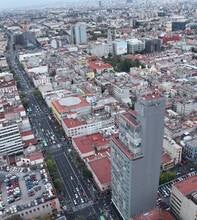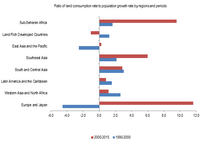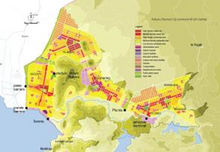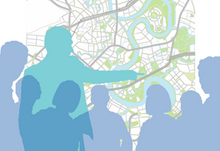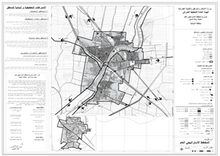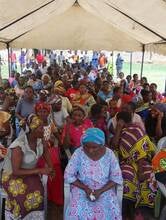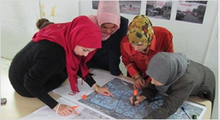By 2030, enhance inclusive and sustainable urbanization and capacity for participatory, integrated and sustainable human settlement planning and management in all countries.
 Indicator 11.3.1: Ratio of land consumption rate to population growth rate
Indicator 11.3.1: Ratio of land consumption rate to population growth rate
A defining feature of many of the world’s cities is an outward expansion far beyond formal administrative boundaries, largely propelled by the use of the automobile, poor urban and regional planning and land speculation. A large proportion of cities both from developed and developing countries have high consuming suburban expansion patterns which often extend to even further peripheries. Cities need to accommodate new and thriving urban functions such as transportation routes, etc. as they expand.
The physical growth of urban areas is disproportionate in relation to population growth, and this result in land consumption that is less efficient in many forms. This type of growth violate every premise of sustainability that an urban area could be judged by including impacting on the environment and causing other negative social and economic consequences such as increasing spatial inequalities and lessening of economies of agglomeration.
Cities require an orderly urban expansion that makes the land use more efficient by planning for future population growths
- Cities are expanding, densities reducing
- African cities will more than double in population up to 2050, and their spatial extent will likely grow three times, aggravating urban sprawl and mobility.
- In Accra, Ghana, between 1991 and 2000 population nearly double, increasing from 1.3 million to 2.5 million inhabitants; over the same period, the built-up area tripled.
- Sprawling cities, like Accra, are found in over 40 per cent of a global sample of 200 cities.
- European cities, despite low or negative population growth rates, continue to expand.
- In the United States, urban sprawl adds costs of around US$400 billion per year, as a result of greater infrastructure, public service delivery and transport costs of Urban Expansion, UN-Habitat, NYU and Lincoln Institute
Our Work
Urban Planning Lab
The Lab is working with 30 cities, focusing on planned city extensions, in-fills and city wide strategies, to improve local policies, plans and designs for compact, integrated and connected socially inclusive cities and neighborhoods in partner cities. Read more,..
Budget: US$ 3,000,000
From 2015 in already 17 countries globally
Urban Planning for City Leaders
Over 400 planners and local leaders have been trained in sustainable urban development in the past 2 years, to enhance land use efficiency for more compact cities and enhance civil society participation in urban planning and management.
Budget: US$ 360,000 + US$ 450,000
The tool has been implemented in seven countries globally 
Strategic Urban plans for Small cities
The project supports improving the urban planning process in Egypt, in conducting policy tools, and provides data and scientific research that supports the development of policy recommendations in order to produce locally adopted Strategic Urban Plans for 70 small cities. Read more,..
Budget: US$9,846,770
The rapid urbanization has led to the loss of significant areas of prime agricultural land
Strengthening Planning for Resettlement and Integration of Refugee Communities at Kalobeyei New Site, Turkana County
The project is developing a 15 km2 sustainable settlement for 60,000 refugees that will integrate the needs of refugee and local communities at the Kalobeyei new site in Turkana County. The new settlement will greatly ease congestion in Kakuma Camp which currently hosts close to 180,000 refugees. Read more,..
Budget: US$ 1,000,000
Project in partnership with UNHCR and World bank
Indicator 11.3.2: Percentage of cities with a direct participation structure of civil society in urban planning and management which operate regularly and democratically
 Cities are best able to combine sustainability and shared prosperity through effective urban governance and a strong participation of civil society in the cities affairs. When appropriate and effective policies, laws and regulations are deployed, and adequate institutional frameworks are developed, urban planning and management can contribute to achieve inclusive and sustainable urbanization. Participatory planning, management and budgeting are key ingredients of local-level governance.
Cities are best able to combine sustainability and shared prosperity through effective urban governance and a strong participation of civil society in the cities affairs. When appropriate and effective policies, laws and regulations are deployed, and adequate institutional frameworks are developed, urban planning and management can contribute to achieve inclusive and sustainable urbanization. Participatory planning, management and budgeting are key ingredients of local-level governance.
When communities, civil society organizations and other local actors are recognized as genuine interlocutors, participation is enhanced and urban planning and management can benefit of these direct forms of democratic decision-making.“Participatory management can help reduce potential conflict and build local people’s feeling ofownership in the government’s plan.
If managed well, participation can help empower the inhabitants to take control of decisions that affect their daily lives. Participatory planning can increase the transparency of governmental decision making. This allows citizens to understand how and why the local government is making certain decisions. It is also a way of holding government members accountable for what they planned to do.
Cities require an orderly urban expansion that makes the land use more efficient by planning for future population growths
- Cities are expanding, densities reducing
- African cities will more than double in population up to 2050, and their spatial extent will likely grow three times, aggravating urban sprawl and mobility.
- In Accra, Ghana, between 1991 and 2000 population nearly double, increasing from 1.3 million to 2.5 million inhabitants; over the same period, the built-up area tripled.
- Sprawling cities, like Accra, are found in over 40 per cent of a global sample of 200 cities.
- European cities, despite low or negative population growth rates, continue to expand.
- In the United States, urban sprawl adds costs of around US$400 billion per year, as a result of greater infrastructure, public service delivery and transport costs
UN-Habitat's work on human settlement planning
Youth Mainstreaming and the Global Urban Youth fund
The project ensures inclusive participation of youth in decision making at all levels and mainstreaming youth in management and planning of cities and support positive economic, social and environmental transformation by strengthening national and regional development policies and strategies.
It is currently being implemented in cities in over 70 countries globally, in partnership with ILO
Strengthening Urban & Regional Planning (SURP)
This project aims to build the capacity of urban planning teams within Ministry of Municipalities and Tourism of the Kurdistan Region, through formal training and on-the-job learning. Training addresses the lack of trained professionals; the need for clear vision and well managed urban planning teams; and the need for an improved system for urban and regional planning in line with KRG sectorial development directions.
Budget: US$ 877,483
Participatory Spatial Planning Support Programme
Over 11,000 housing units were destroyed as a result of the last conflict in Gaza, with 71% of the damage occurring within 3km of the border with Israel. The project is supporting participatory spatial planning in 5 municipalities in Gaza to undertake participatory spatial planning in order to ‘build back better’ and address issues of destruction from the previous conflict and future population growth.
Budget: US$ 750,000
Finance for City Leaders
The handbook provides quick reference on municipal finance to city leaders, majors, treasury staff and planners. It offers guidance for SDG implementation and progress and support guidelines for basic financial management and complex financial products to local leaders offering simple descriptions and describing procedures for policy implementation.
Budget: US$ 100,000
Project in partnership with UNCDF and UNDESA
